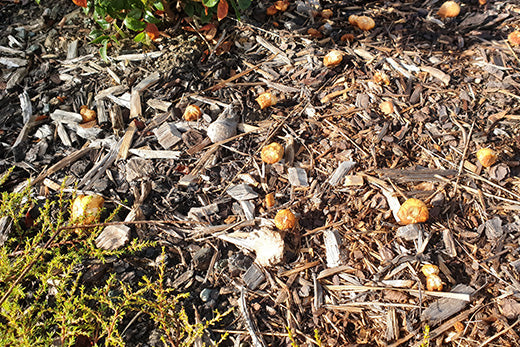In this blog, we’re looking at the widespread outbreak of mushrooms on garden soil and mulch - why and when it happens, and how to deal with it.
Auckland’s recent unseasonal wet and warm weather has seen a huge increase in the ‘fruiting’ of fungi in the form of toadstools and mushrooms. If this is happening on your property, you might be wondering what you can do. The good news? It shows you have plenty of good biological activity in your soil, and these fungi are mostly harmless!
Much like the human microbiome, it’s all about establishing a healthy balance of beneficial microbes in your garden and keeping fungal growth in check.

Ironically most of the mushroom fungi developing now are in the most visible parts of the garden, which doesn’t help the look of a beautifully planted area! They often arrive where compost, garden mix or mulch has been added to enrich the soil in moist open, sunny areas.
How to deal with them?
Removing them by hand and disposing of them in the rubbish will help. Practising good garden hygiene is very important to help stop the transfer of spores to other parts of the garden, so clean pruning tools and garden gloves after removing the mushrooms. A bonus is that the recent change to cooler temperatures will limit their spread.
Applying chemical fertiliser also discourages them and has the benefit of feeding neighbouring plants. A quick-release fertiliser such as Prolawn All Purpose is recommended for this.
Raised beds, including vegetable gardens
Because the raised bed generally has faster drainage, the problem should not be so widespread. If the plants in the bed are edibles, remove the mushrooms as a precaution. While they are not poisonous just to touch, they should not be ingested.
Drainage
Good drainage is essential to help minimise fungal disease. Wet soil encourages fungal growth, as does the over-watering of plants which has occurred naturally this year with the heavy rainfall. If the soil has become compacted through heavy rainfall, adding gypsum will help open it up and absorb water better.
Raised garden beds are one way to gain more control over your soil quality and moisture levels, using a base layer of metal or scoria for drainage, followed by quality topsoil and topped off with garden mix.
Lawns

If you’ve got a spread of toadstools in your lawn, gathering them up will reduce the spread of spores. Our turf experts suggest picking up lawn clippings after mowing and applying Prolawn All Purpose Fertiliser. As mentioned above, chemical fertilisers tend to kill off fungi.
And once winter has really set in, they should disappear for now!
